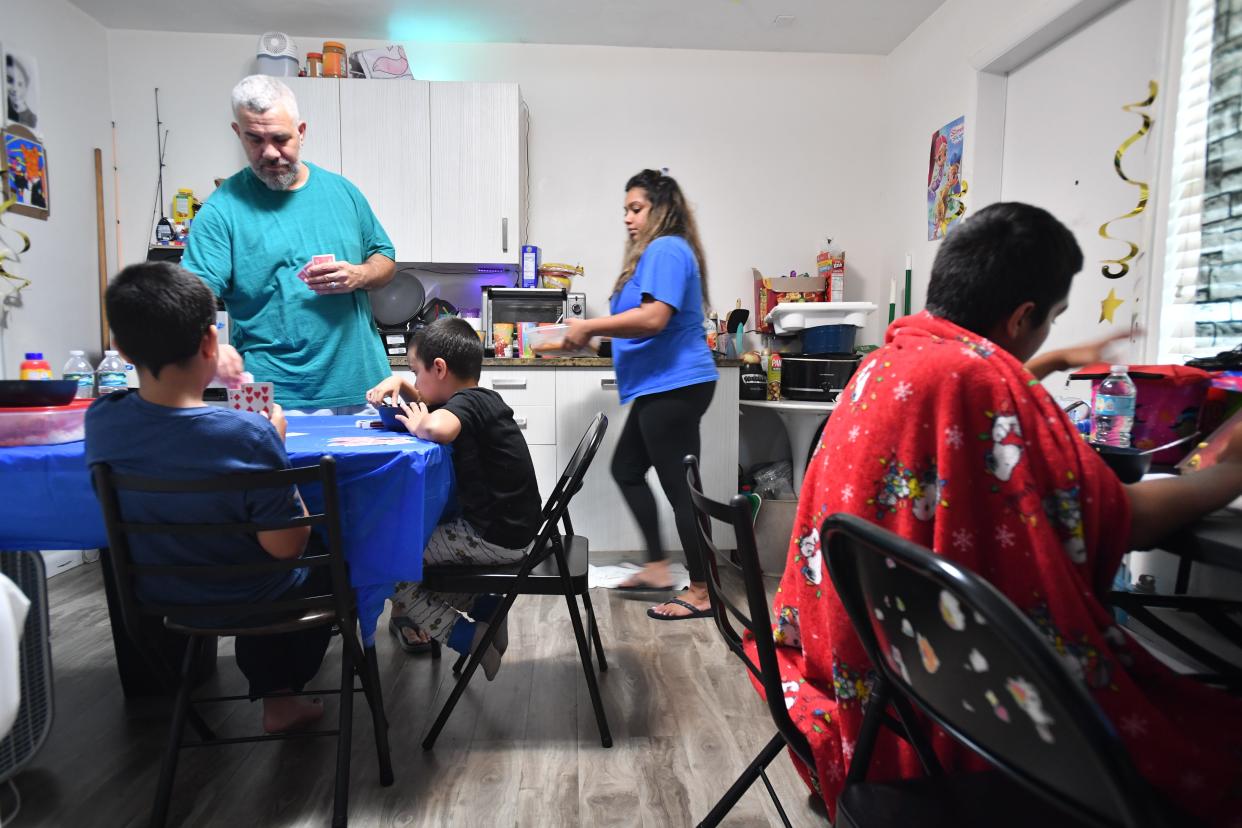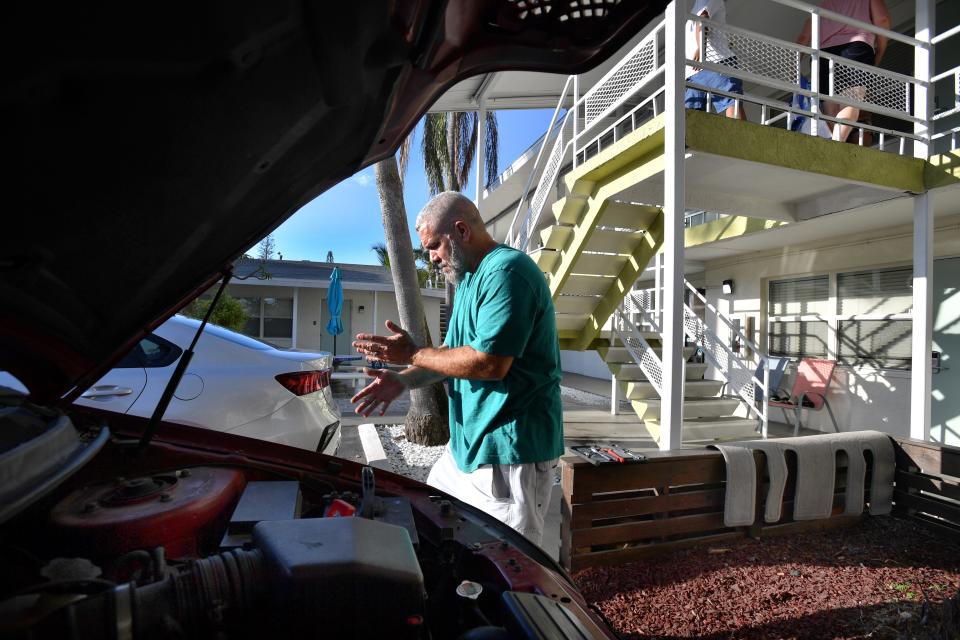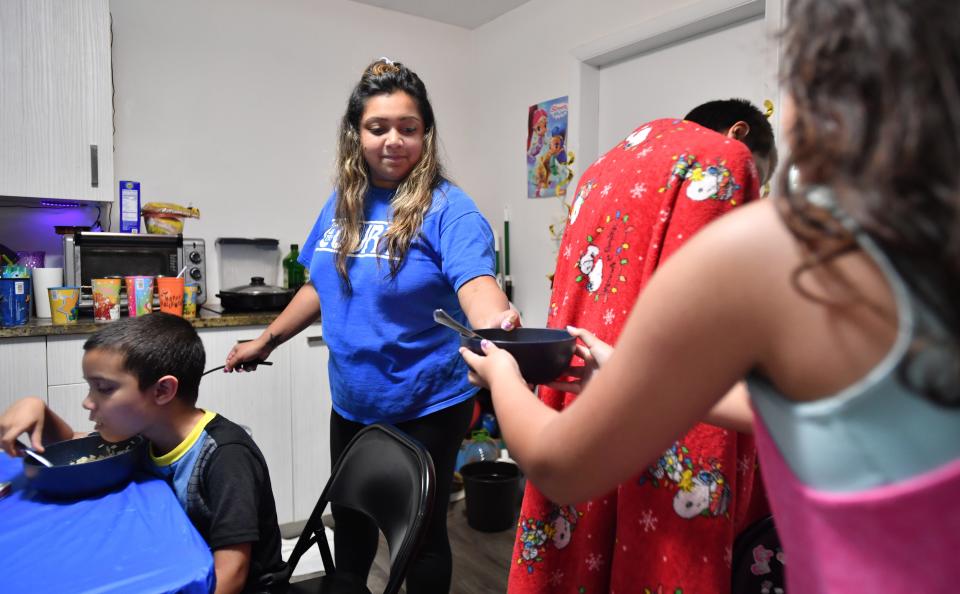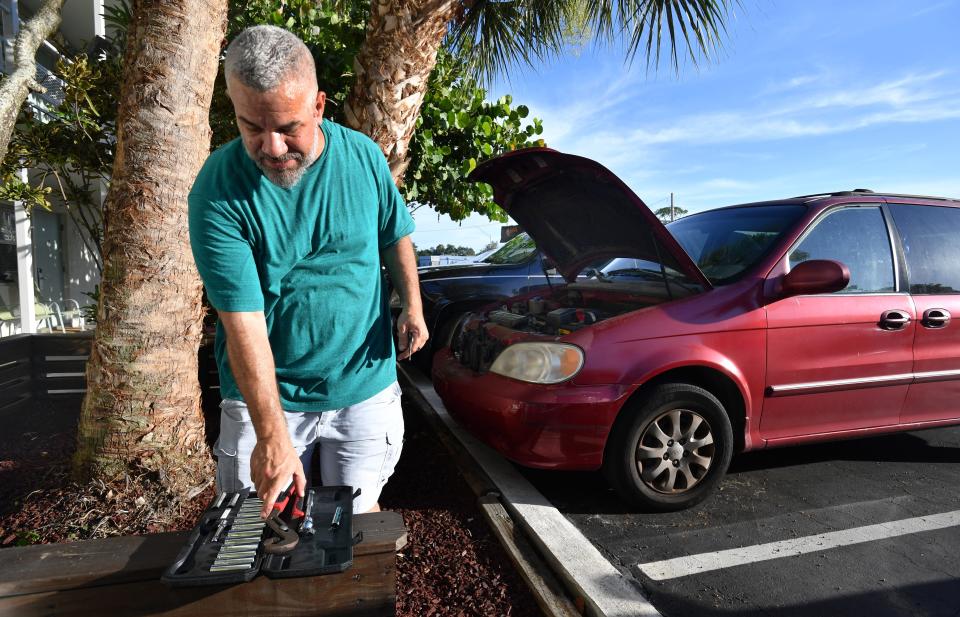When everything rides on the car: How one family navigates a trifecta of crises

Ria Singh held her breath every day she got behind the wheel of her car.
The family’s 2003 Kia felt like the last thing holding the household finances together.
For almost two years, Singh, her husband, David Cabrera, and their four young children have lived in a hotel room at the Regency Inn & Suites in Sarasota. The arrangement, they thought, would be temporary when they moved back to Florida for a good job – only to find themselves trapped in a housing crisis.
After her husband was hurt on an HVAC work site, Singh, 34, got work in a warehouse and then this spring as a medical records specialist, commuting 30 minutes each way.
Wheels of Success: Nonprofits test transportation solutions for families on the edge
From June: Affordable housing development in North Sarasota given boost by Barancik grant
Given soaring gas prices and the weekly hotel expense of up to $550, they were barely getting by – struggling to save for an apartment amid skyrocketing rents as well as steep requirements for deposits and first and last months' rents, totaling thousands of dollars before move-in.
With one car and facing a severe shortage in affordable child care, her husband’s employment options also were limited. Mostly he worked evenings and weekends as a banquet server.
Yet the two made too much money to qualify for public food assistance and other programs.
Through it all, the key piece of this fragile puzzle was the Kia – getting Singh and her husband to work and the grocery store, and the kids to their school bus stops.
Even that threatened to give out, demanding coolant and steering fluid every day.
“It will start screaming like a newborn baby,” Singh said. “We have to keep putting faith in this vehicle, that it lasts.”
A replacement was out of the question, as new and even used car prices rose through the roof. The last thing they could afford was the Kia's breakdown.
And then it happened -- ahead of another huge development. On a late June morning as Singh drove to work, the Kia quit, stranding her on the side of the road.
A "vicious circle"

Singh and her husband are among thousands of working families caught in a seemingly endless loop of interlocking hardships, according to social service agencies.
At the center of crises in affordable housing and child care is a nightmare of transportation woes, they say – leaving legions of local residents stuck in their cars for hours-long daily commutes.
As housing costs have risen, pushing local working families to live in hotels or remote communities far from work or available child care, their cars are more critical than ever. Some priced-out residents have resorted to sleeping in the vehicles.
With gas, food and other expenses climbing as inflation reaches near-record levels, little is left to pay for car repairs. A blown tire or transmission – plus days of missed work – can wreak havoc for families, bringing many households to the breaking point.
“It becomes a bit of a vicious circle,” said Chris Russi, community liaison with the Glasser Schoenbaum Human Services Center.
“All of this contributes to the destabilization of a household unit,” she added, “especially when you have multiple people trying to get to work in multiple directions.”
Yet unlike with rental or child care assistance, few programs exist locally to help with car repairs, she added.
One of them is Season of Sharing, overseen by the Community Foundation of Sarasota County. The fund helps residents in a four-county area get back on their feet by aiding with rent or mortgages, utility bills, child care, transportation and other crucial expenses.
The last six months, requests to her office for Season of Sharing help with car repairs have doubled, said Russi, a fiscal agent for the fund, which has contributed to some recent success stories.
The program requires three estimates from mechanics, which can pose a challenge for owners if the car needs to be towed, Russi said. Also, sometimes the vehicle can’t be salvaged or the required repairs go well beyond what the assistance can cover.
When that happens, families must scramble.
Domino effect

They face a patchwork of help – gas gift cards at area schools or local churches assisting members with a car.
Goodwill Manasota once had a used-car lot, but that has closed. The United Way Suncoast has a program that helps participants save for a used car, pairing them with a financial coach while Suncoast Credit Union provides matching funds.
Also, the Sarasota County Area Transit now has an on-demand service that works like ride-sharing operations such as Uber or Lyft. However, service is limited within four specialized geographic zones and would not help someone needing to commute between zones – for instance, from a home in North Port to a job in Sarasota – which is increasingly common for working families.
The service also doesn’t operate overnight.
Unlike places like New York City with mass transit, the area’s lack of reliable public transportation – such as a subway system or buses that pass every few minutes – increases a working family’s dependence on a functioning car, said Erin Minor, executive director of the nonprofit Harvest House.
That’s particularly true for single mothers, she stressed – for whom a trip to the grocery store on a bus with two or three children in tow is extremely difficult, restricting the items she can carry while also minding the kids.
“It does limit your options for employment as well,” she added about a lack of a car – referring to jobs located far off bus lines or with late hours after the buses stop running.
When a car breaks down, the household grinds to a halt.
“It really is a domino effect, from your income to your kids’ school to your employment,” she said. “It touches every point.”
Day by day

Stranded that morning on the side of the road in late June, Singh had no choice but to pay $75 to get the Kia towed back to the hotel. The timing was terrible, cutting into savings just as she was preparing for multiple birthdays for the children this summer -- when she decorates the hotel room with banners, trying to create a normal, fun childhood for the kids, ages 13, 11, 9 and 6.
"Every time we are saving, something happens," she said.
While Singh called her boss, vowing to make up the missed hours, her husband fashioned a temporary repair to the radiator hose before driving the Kia to an auto parts store. With a new part in hand, he fixed it himself.
The following week, it broke down again, this time from a problem with the battery system, causing him to miss work that weekend. At the same time, Singh started to feel dizzy, her blood pressure spiking.
She took a test, shocked at the results. Despite their preventative precautions, the test was positive. She was pregnant.
"I was dumbfounded," she said.
While the children cheered, Singh's stress only increased -- exacerbating her blood pressure and the dangerous threat of preeclampsia, doctors told her, which in turn added to her worries.
Overwhelmed, to calm down she cleaned and tried to relax while David led the kids on adventures to the park behind the hotel, scavenger hunting and searching for bugs.
Though not especially religious, she turned to prayer: "If this is meant to be, let it be."
Talking things over with David, she made peace with the news.
"We'll make it work, we always make it work," she told herself. Even if David had to return to HVAC jobs, despite his back injury, they would somehow get by. They had converted a hotel room into a warm home for six -- organizing space for homework and meals, bringing the kids to the pool. They could do it with a baby, too. She started to take prenatal vitamins.
But then last week while at the office, her head pounded, her blood pressure rising again.
At the hospital with her boss, Singh got the news: she was having a miscarriage.
Later, alone in the Kia, Singh broke down and wept.
Once more, she tried to make peace with what happened — it wasn't meant to be, she thought — and steeled herself to be strong for the kids, to help them process the loss.
Taking a day to recover, Singh and David brought the kids to a pier to fish and cook out.
The next day, Singh would be right back to the office, with David on the work schedule for the coming weekend.
The two can only hope for a second car, which would help them better juggle child care between them during the school year and open more job options for David -- which in turn could help them save for an apartment.
For now, they can't think that far ahead. They are still holding their breath when it comes to the Kia, wondering how long it will last.
“We’re just driving it day by day,” she said, “praying to God.”
This article originally appeared on Sarasota Herald-Tribune: Transportation key for Sarasota families facing fragile financial puzzle

